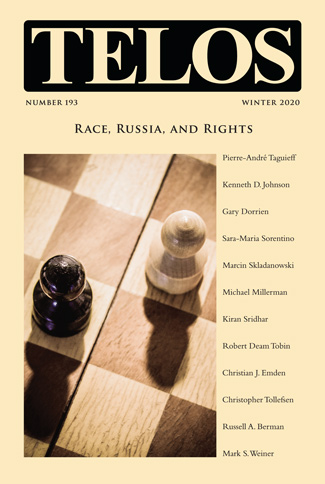Bruno Retailleau represents the Vendée in the French Senate, where he has been serving as President of The Republican group since 2014. His comments prompted by the storming of the Capitol in Washington on January 6 provide a useful European perspective, an alternative to the polarized discourse that has predominated in the United States. In addition to a pointed evaluation of the events themselves, his remarks also offer insight into political positioning in France in advance of the 2022 presidential election: as we are on the eve of the post-Merkel era in Germany, a post-Macron France may be approaching as well. More importantly, however, Retailleau reminds us that what happened in Washington is indicative of tendencies that are not exclusively American. He describes root causes of some contemporary social conflict, treating the Washington riot as symptomatic of tensions as present in France as in the United States, as well as across the West. At stake is more than Trump’s rhetoric, the impeachment debate, or the response to the 2020 presidential election outcome. The issues that fueled the populism of the past four years have not disappeared. Retailleau shows why.
|
In today’s episode of the Telos Press Podcast, Camelia Raghinaru talks with Loren Goodman about his article “Poetic Impositions: Japanese–U.S. Constitutional Problems of Peace and Tranquility,” from Telos 189 (Winter 2019). An excerpt of the article appears here. If your university has an online subscription to Telos, you can read the full article at the Telos Online website. For non-subscribers, learn how your university can begin a subscription to Telos at our library recommendation page. Purchase a print copy of Telos 189 in our online store. Telos 193 (Winter 2020): Race, Russia, and Rights is now available for purchase in our store. Individual subscriptions to Telos are also available in both print and online formats.
Isaac Lopez’s comments in “Why Trump Will Win” anticipate Trump’s reelection as the result of a reactionary backlash by a conservative moderate public. This backlash is directed at a weak and failing leadership in the Republican Party and a Democratic Party that has abandoned the “silent majority” for the interests of minorities and women. Yet not only is it questionable whether this analysis of the backlash offers any insight, it is questionable whether the backlash is even representative of mainstream public opinion. There is more of a consensus for the progressive agenda than Lopez is willing to admit. The wealthy suburbs of New York are as much inclined to vote for a progressive Black gay candidate as a working-class district in Queens is inclined to elect a progressive Latinx. Most of all, let us not forget that even in the face of personal animosity, Hillary Clinton won the popular vote by 3 million votes. So how does all of this square with the reactionary backlash of the “silent majority”? As we all know, Trump won the presidency through the Electoral College by winning Michigan, Wisconsin, and Pennsylvania with about 70 thousand votes. It is possible that the reactionary backlash in these states flipped them for Trump. But not only does this not make them representative of public opinion, given the fragmented, unverified, and biased sources that feed public opinion today; it is questionable whether the reactionary backlash is itself founded on serious grievances. With demographic inequalities shifting the balance of federal power to states less representative of the national consensus, the outcome of presidential elections is determined by a few states where local opinion, whether informed, uninformed, or dis-informed, can determine the long-term outcome of national politics. From the beginning of Donald Trump’s campaign for the presidency and throughout his administration, the most consistent point of orientation in his politics has been the priority of the nation. It informed the slogan “Make America Great Again,” which initially shocked political sensibilities, since it implied the accusation that previous bipartisan political leadership had stood by during a decline or even facilitated a loss of greatness. The priority of the nation similarly underpinned the formula of “America First,” as the designation of a foreign policy that would give greater attention to national interest and therefore break with established patterns of multilateralism. Trump himself has embraced the term “nationalist,” and this marks his difference from both the free trade internationalism that used to define the neoliberal Republicans as well as from the multiculturalism that dominates the identity-political Democrats. Between those two alternatives, globalism and fragmentation, Trump has opted for the nation. With that choice, he put his finger on the forgotten category—class—in an era of growing inequality. “Nation” serves as the organizing principle for programs purporting to achieve vertical integration, the “whole nation,” i.e., a promise—whether fulfilled or not—of an inclusive nationalism. Trump’s nationalism therefore is better described as a national populism. This aspiration for inclusion outweighs a simultaneous function of exclusionary nationalism, the differentiation from other nations, although that aspect clearly plays a role as well, especially in immigration policies. |
||||
|
Telos Press Publishing · PO Box 811 · Candor, NY 13743 · Phone: 212-228-6479 Privacy Policy · Data Protection Copyright © 2025 Telos Press Publishing · All Rights Reserved |
||||



